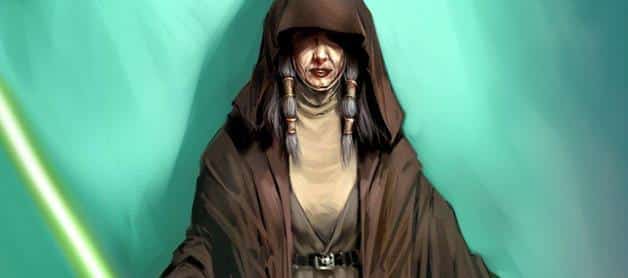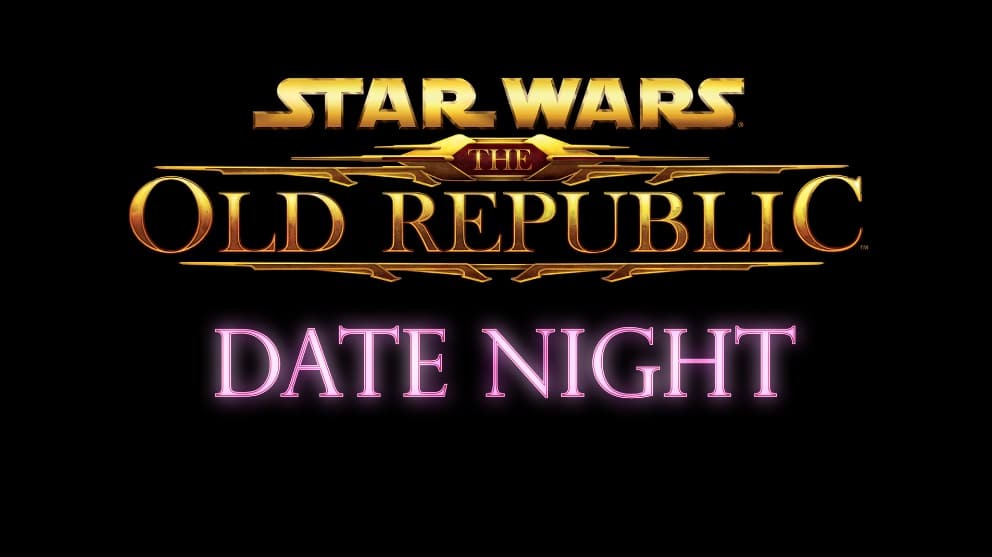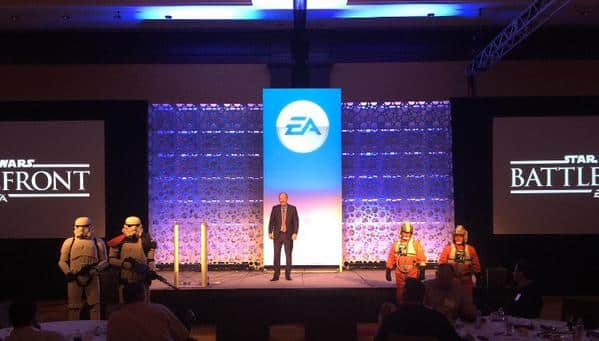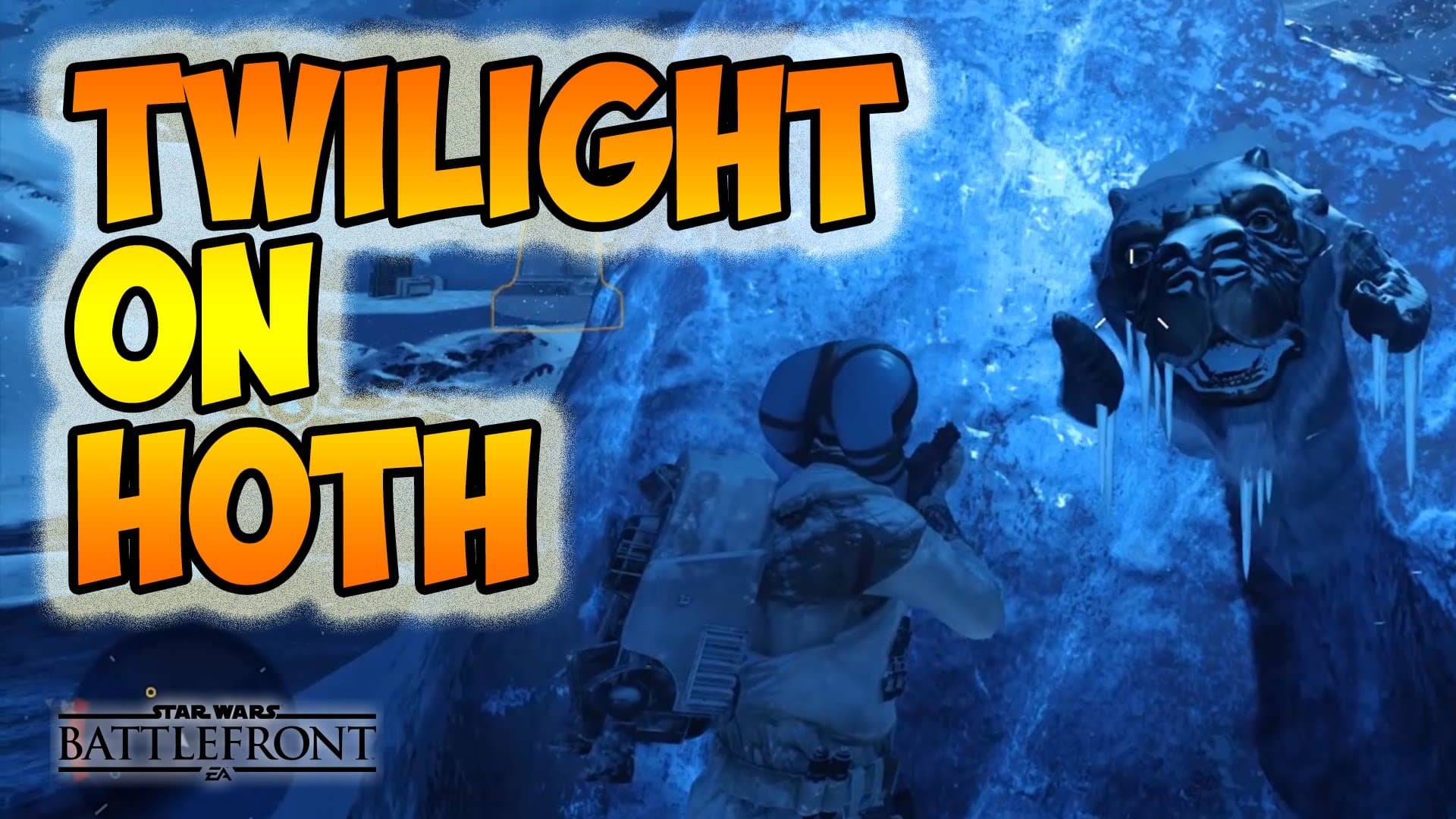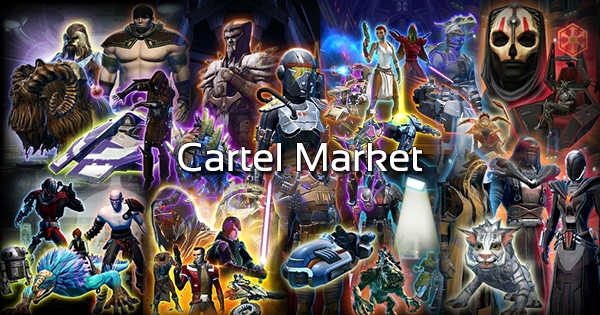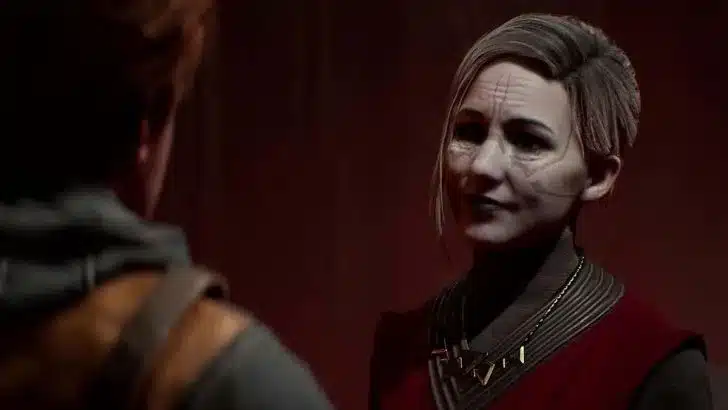Kreia is one of the most complex and fascinating characters in the Star Wars universe, standing out not just for her deep philosophical insights but also for her intricate ties to key events and characters across the galaxy. From her mysterious origins in the Old Republic era to her enduring influence in the Star Wars Expanded Universe, Kreia remains a character shrouded in both mystery and wisdom. In this article, we’ll explore the lore surrounding Kreia, her connections to Revan, her pivotal role in Knights of the Old Republic II: The Sith Lords (KOTOR II), and her lasting impact on the Star Wars universe, including more recent appearances in comics and books.
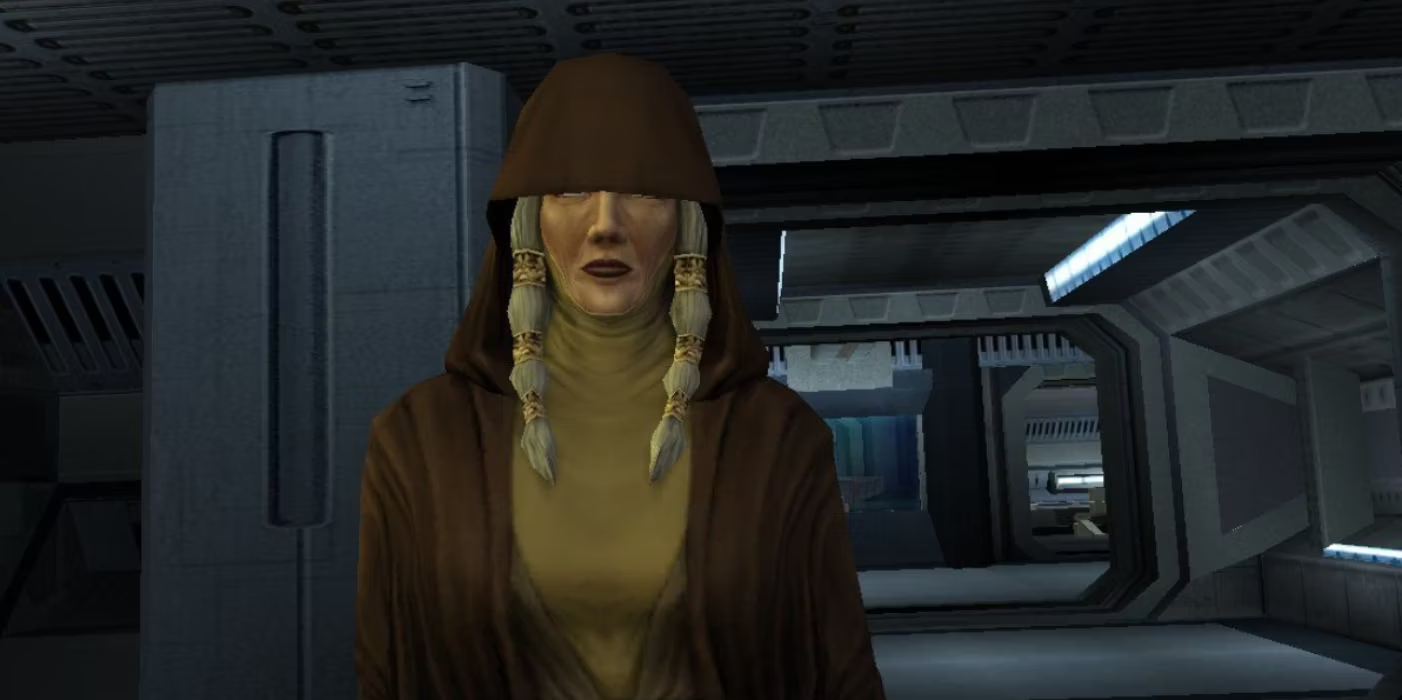
Chapter 1: Kreia’s Origins and Early Life
Let’s talk about Kreia—because when it comes to mysterious backstories in the Star Wars universe, she’s got one of the best (or most frustrating, depending on how you look at it). Trying to pin down Kreia’s early life is like trying to catch a shadow. You see it, you think you’ve got it, but then it slips away, leaving you wondering if you ever knew anything at all.
Kreia, or as some might have known her in a past life, the Jedi Master Who Shall Not Be Named, starts her journey as a member of the Jedi Order. Now, let’s be clear: Kreia wasn’t your run-of-the-mill Jedi. If you’re picturing her peacefully meditating in a sunlit temple, maybe with a couple of younglings hanging on her every word—forget it. Kreia was never that simple. She was the kind of teacher who would throw a curveball just to see if you could catch it, or better yet, question why you were trying to catch it in the first place.
A Jedi Outcast with a Unique Perspective
Kreia was, by all accounts, a brilliant Jedi Master. She had the wisdom, the skills, and the credentials. But she also had something that set her apart from the rest: a burning desire to understand the Force on a level that most Jedi didn’t dare explore. While other Jedi were content with their black-and-white view of the Force, Kreia saw the galaxy in shades of gray.
Her teachings, however, were not exactly popular at Jedi Academy. Picture it: Kreia is delivering a lecture, explaining how the Force might not be as benevolent as everyone thinks, while the rest of the Jedi Masters are exchanging nervous glances and mentally drafting the polite rejection letter they’re going to send her way. Kreia’s ideas were too radical, too unconventional, and—let’s be honest—a bit too much for the traditionalists in the Order. She was like the Jedi version of that one professor in college who blew your mind but also made you question whether you really wanted to be there.
Eventually, the Jedi Council had enough. Kreia’s relentless questioning of the Force and her unconventional teachings led to her being shown the door. Imagine being kicked out of an organization that preaches peace and understanding—it takes a lot to make that happen! But Kreia wasn’t just any Jedi; she was a thinker, a philosopher, and someone who wasn’t afraid to challenge the status quo. The Council might have been polite about it, but the message was clear: “Thanks, Kreia, but maybe it’s time you took your ideas elsewhere.”
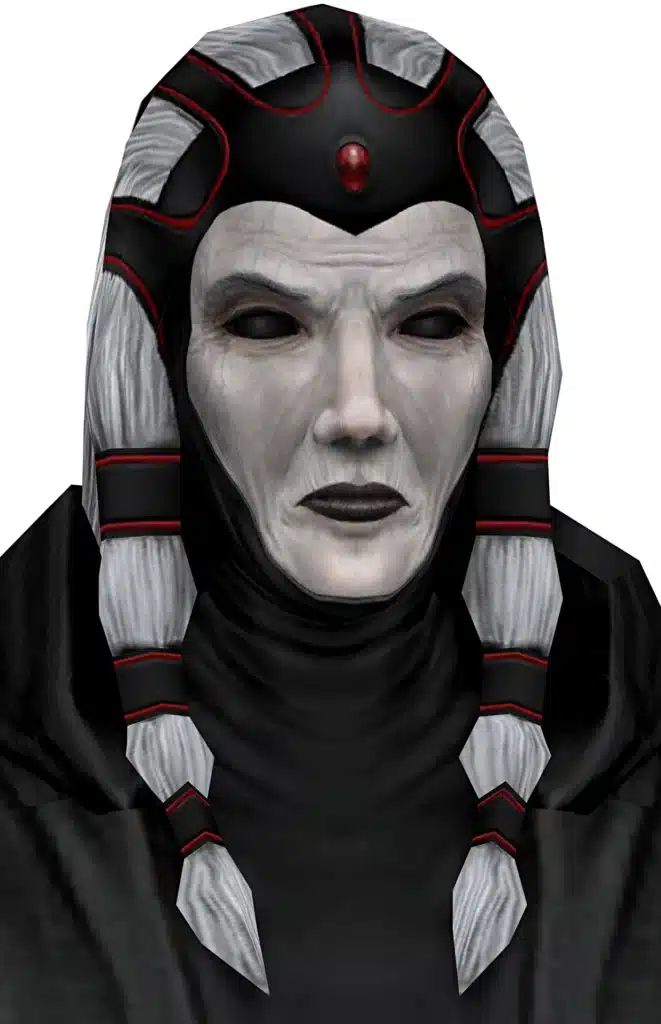
From Jedi to Exile: The Birth of Disillusionment
Kreia’s exile from the Jedi Order wasn’t just a career change; it was a complete transformation. She didn’t leave the Order with her head hung low. No, she walked away with a smoldering sense of injustice and a mission to uncover the true nature of the Force—no matter where that path might lead her.
This is where Kreia’s story takes a dark turn. Exiled and disillusioned, she began to view the Force not as a guiding light, but as a manipulative entity that played both the Jedi and the Sith like puppets. And Kreia? Well, she wasn’t about to be anyone’s puppet. Her fall to the dark side wasn’t a dramatic plunge into evil; it was a gradual, philosophical journey that led her to reject both the Jedi and Sith ideologies.
Imagine Kreia, wandering the galaxy, pondering the nature of the Force, and slowly coming to the conclusion that the entire galaxy was stuck in a never-ending cycle of conflict—all because of this mysterious power that everyone seemed to worship. For Kreia, the Force was less of a mystical energy field and more of a cosmic troll, toying with the lives of beings across the galaxy.
The Emergence of Darth Traya
After her exile, Kreia didn’t just fade into obscurity. Instead, she reinvented herself—this time as Darth Traya, a Sith Lord with a bone to pick not just with the Jedi or the Sith, but with the Force itself. And let’s be clear: when Kreia picks a bone, it’s not a petty grievance; it’s a full-blown philosophical crusade.
But unlike your typical Sith, who might revel in power and destruction, Kreia’s motives were far more cerebral. She wasn’t in it for the power or the glory. For her, becoming Darth Traya was a means to an end—a way to gain the knowledge and influence she needed to challenge the very nature of the Force. She was like that one friend who insists on playing devil’s advocate in every argument, except in this case, the argument was about the fundamental nature of the universe.
Kreia’s transformation into Darth Traya marked the beginning of a new chapter in her life—one that would see her become one of the most enigmatic and intellectually challenging figures in the Star Wars universe. She didn’t just flip to the dark side; she practically rewrote the rules of what it meant to be a Sith. And in true Kreia fashion, she did it all while keeping everyone around her guessing about her true intentions.
The Enigma That Is Kreia
So, what do we really know about Kreia’s early life? Not much, to be honest—and that’s exactly how she’d want it. Kreia is an enigma wrapped in a mystery, with a side of “you’ll never figure me out.” Her origins are as elusive as the Force she sought to understand, and her journey from Jedi Master to Darth Traya is a story of intellectual curiosity, philosophical rebellion, and a deep-seated desire to break free from the constraints of destiny.
Kreia’s early life sets the stage for everything that comes next, and while we might not have all the answers, one thing is clear: Kreia was never just a Jedi or just a Sith. She was something else entirely—something that defies easy categorization. And in the Star Wars universe, where so much is about light versus dark, good versus evil, that makes Kreia a truly unique and fascinating character.
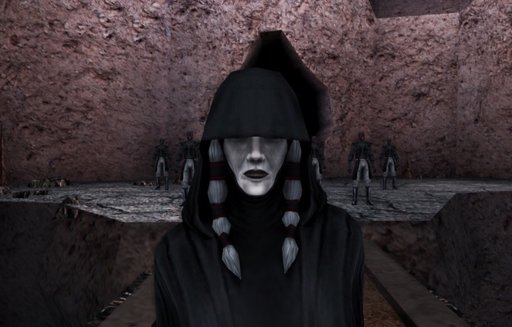
Chapter 2: Kreia’s Connection to Revan and the Jedi Civil War
Now, if we’re talking about Kreia, we absolutely have to talk about her relationship with Revan, one of the most legendary figures in Star Wars history. Think of this dynamic duo as the galaxy’s most complicated teacher-student relationship—sort of like Mr. Miyagi and Daniel, if Mr. Miyagi occasionally toyed with the dark side and questioned the very fabric of existence.
Kreia, before she became the enigmatic and somewhat cynical figure we meet in KOTOR II, was a Jedi Master who played a significant role in shaping Revan’s early development. She was more than just a mentor to Revan; she was a guiding force (no pun intended) in his life. Kreia didn’t just teach Revan how to wield a lightsaber or tap into the Force—she taught him how to think critically, to question everything, and to see the galaxy in all its moral complexity.
Revan was a prodigy, a Jedi Knight with the potential to change the galaxy, and Kreia recognized that potential from the start. But here’s where things get interesting: Kreia wasn’t just trying to mold Revan into a typical Jedi. She saw something in him that others didn’t—an ability to walk the line between light and dark, to make the tough decisions that others couldn’t, or wouldn’t, make. And Kreia, being the philosophical rebel that she was, encouraged this.
A Relationship Built on Philosophy and Rebellion
The connection between Kreia and Revan was more than just a standard mentor-student bond. It was a meeting of minds, two individuals who were never content with the status quo. Revan wasn’t just another student to Kreia; he was someone who could potentially see the galaxy as she did—full of shades of gray rather than simple black and white.
Kreia’s teachings likely fueled Revan’s eventual turn to the dark side, though it wasn’t a straightforward descent into evil. No, Revan’s fall was more like a calculated step, a necessary evil in his mind, to save the galaxy from a greater threat. And guess who might have helped him arrive at that conclusion? That’s right, our favorite contrarian Jedi Master, Kreia. She didn’t push Revan toward the dark side in the traditional sense; instead, she pushed him to question the Jedi’s rigid doctrine and consider the possibility that the ends might justify the means.
You could say Kreia was the little voice in Revan’s head that said, “Why not both?” when it came to choosing between the light and dark sides of the Force. She didn’t believe in absolutes—something that definitely rubbed off on Revan. And while the Jedi might have been shaking their heads in disapproval, Kreia was likely somewhere in the background, smirking at the chaos she helped set in motion.
The Jedi Civil War: A Conflict with Deep Roots
Revan’s eventual fall to the dark side and the ensuing Jedi Civil War were events that shook the galaxy to its core, and Kreia’s influence was woven throughout it all. The Jedi Civil War wasn’t just a simple conflict between good and evil; it was a war rooted in complex ideologies, conflicting philosophies, and the very nature of the Force itself. And at the heart of this storm was Kreia, the philosopher-mentor who had planted the seeds of doubt and rebellion in Revan’s mind.
While Revan became the face of the war, Kreia’s impact was felt in the shadows. She wasn’t out there leading troops or engaging in epic lightsaber duels, but her influence was undeniable. Kreia had, in a way, helped create a monster—or at least a very powerful, morally ambiguous anti-hero. Revan’s actions during the war, from his betrayal of the Jedi to his attempts to consolidate power, all bore the fingerprints of Kreia’s teachings.
But here’s the kicker: despite all of this, Kreia didn’t exactly join Revan on his dark crusade. Instead, she took a step back, watching as her former student’s actions played out on the galactic stage. And while she didn’t agree with everything Revan did, you can bet she found it all incredibly interesting from a philosophical standpoint.
A Divergence of Paths: Kreia and Revan Part Ways
As the Jedi Civil War raged on, Kreia and Revan’s paths began to diverge. While Revan was consumed by his mission to save the galaxy (even if it meant breaking a few eggs—or planets—along the way), Kreia’s journey took her down a different, even darker path. She didn’t just want to challenge the Jedi or the Sith; she wanted to challenge the very nature of the Force itself.
Kreia saw the Jedi Civil War as proof of the Force’s manipulative nature, a cosmic puppet show where beings like Revan were nothing more than marionettes. And while Revan was busy trying to rewrite the rules of the galaxy, Kreia was planning something far more radical: to break free from the Force’s influence altogether.
Their separation wasn’t born out of animosity but rather a fundamental difference in goals. Revan sought to use the dark side to bring about what he saw as necessary change, while Kreia sought to destroy the very thing that drove such conflicts in the first place. It was a philosophical rift that couldn’t be bridged, no matter how deep their connection had once been.
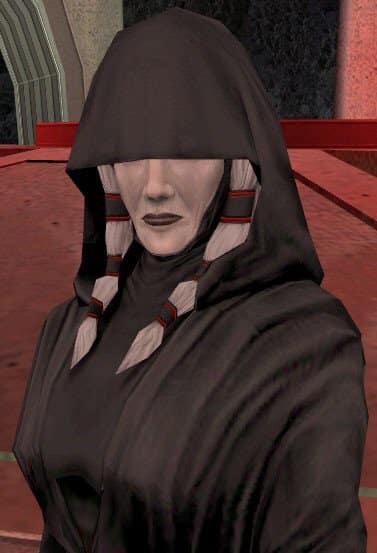
The Legacy of Kreia and Revan
In the end, the connection between Kreia and Revan is one of the most fascinating and complex relationships in Star Wars lore. Kreia’s influence on Revan shaped not just his destiny but the fate of the entire galaxy. The Jedi Civil War, with all its chaos and moral ambiguity, was in many ways a manifestation of Kreia’s teachings, her influence reaching far beyond the confines of a simple master-apprentice relationship.
Kreia’s legacy is one of intellectual curiosity, moral complexity, and a deep-seated desire to challenge the status quo. Revan might have been the one who captured the galaxy’s attention, but Kreia was the one who set the stage. Their relationship is a testament to the idea that in the Star Wars universe, nothing is ever as simple as it seems, and the lines between light and dark, good and evil, are often blurred by the influence of those who see the world in shades of gray.
So, the next time you think about Revan’s impact on the galaxy, don’t forget the role Kreia played behind the scenes. She may not have been on the front lines, but her fingerprints are all over the events that shaped the galaxy during that tumultuous time. Kreia was the mentor who asked the tough questions, challenged the easy answers, and, in doing so, helped create one of the most legendary figures in Star Wars history.
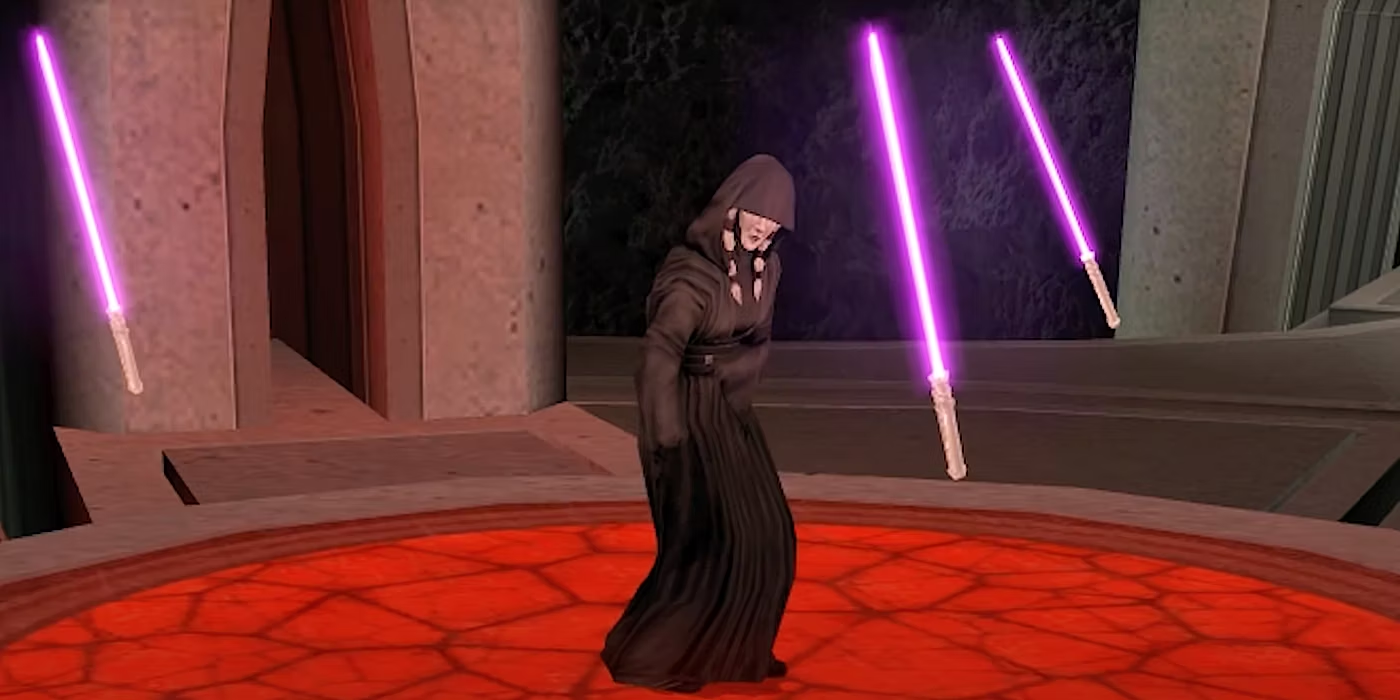
Chapter 3: Kreia’s Role in Knights of the Old Republic II: The Sith Lords
If Kreia were a character in a movie, her entrance in Knights of the Old Republic II: The Sith Lords would be the kind of moment where the music gets all ominous, the lights dim, and everyone in the audience leans forward a little. She doesn’t burst onto the scene with flashy moves or a dramatic reveal—no, that’s not her style. Instead, she quietly inserts herself into the story, leaving you wondering if she’s here to help, hinder, or just mess with your head.
When players first meet Kreia, she’s this mysterious old woman with a lot of cryptic advice and a habit of hanging around in the shadows, metaphorically speaking. She’s the mentor to the Exile, the player’s character, but from the get-go, it’s clear she’s not your typical mentor. For one, she’s not exactly overflowing with positivity. Kreia’s teachings are laced with cynicism, and she’s more likely to challenge your decisions than pat you on the back for them. In other words, if you were hoping for a Yoda-like figure to guide you on your journey, well, buckle up, because Kreia is going to take you on a very different kind of ride.
The Cryptic Guide: Kreia’s Teaching Style
Kreia’s approach to mentorship can be summed up in one word: tough love. Except, you know, without the love part. She’s like that one professor who never gives you a straight answer and responds to every question with, “But what do you think?” It’s frustrating, sure, but it also pushes you to think for yourself—and that’s exactly what Kreia wants.
Throughout KOTOR II, Kreia challenges the Exile (and by extension, the player) to question everything. And I do mean everything. The Jedi? Bunch of rigid traditionalists. The Sith? Power-hungry maniacs. The Force? Oh, don’t even get her started on the Force. Kreia sees the Force as this cosmic puppeteer, pulling the strings of every living being in the galaxy, and she’s not shy about sharing her disdain for it.
Her teachings are filled with moral ambiguity and philosophical depth, making every conversation with her a mental workout. Kreia’s not just interested in whether you make the right choice—she wants to know why you made it and whether you understand the implications of your actions. And just when you think you’ve figured her out, she’ll throw another curveball your way, leaving you second-guessing everything you thought you knew.
The Manipulator: Kreia’s Hidden Agenda
Of course, there’s more to Kreia than just being a tough mentor. She’s got her own agenda, and let’s just say it’s not exactly aligned with your typical Jedi or Sith goals. Kreia isn’t content with just guiding the Exile; she’s actively manipulating events behind the scenes, pulling strings that even the Exile doesn’t see until it’s almost too late.
Kreia’s ultimate goal is nothing short of revolutionary—or, depending on how you look at it, catastrophic. She wants to destroy the Force. Yep, you read that right. Kreia isn’t just out to defeat the Sith or reform the Jedi; she wants to cut the galaxy’s connection to the Force entirely, freeing everyone from what she sees as its oppressive influence.
Her reasoning? Kreia believes that as long as the Force exists, the galaxy will be trapped in an endless cycle of conflict, with the Jedi and Sith playing their eternal game of tug-of-war. To her, the Force is like a cosmic soap opera that never ends, and she’s had enough of it. So, in typical Kreia fashion, she decides to do something about it—something drastic.
Throughout the game, Kreia manipulates both the Exile and the supporting characters, pushing them towards her ultimate goal. She’s not above lying, deceiving, or even sacrificing others to achieve her ends. But here’s the twist: Kreia genuinely believes she’s doing the right thing. In her mind, she’s not the villain—she’s the only one with the courage to see the galaxy as it truly is and do what needs to be done.

The Ultimate Test: Kreia’s Role as an Antagonist
Kreia’s role as the main antagonist in KOTOR II is anything but straightforward. Sure, she’s the “bad guy” in the traditional sense, but she’s not your typical Sith Lord cackling maniacally from a throne made of skulls. Instead, Kreia is a philosophical antagonist, one who forces you to confront some pretty uncomfortable truths about the galaxy, the Force, and your own choices.
By the time the final confrontation rolls around, Kreia’s motives and her relationship with the Exile are as complex as ever. She’s not trying to destroy the galaxy or seize power for herself—she’s trying to break the galaxy free from what she sees as its chains. And whether you agree with her or not, there’s no denying that Kreia’s vision is compelling in its own twisted way.
The battle with Kreia isn’t just a physical fight; it’s a battle of ideologies. She challenges everything the Exile stands for, forcing them to confront the nature of the Force and their place in the galaxy. It’s not just about defeating Kreia—it’s about understanding her, and in doing so, understanding yourself.
Kreia’s Legacy: A Lasting Impact
Kreia’s role in KOTOR II isn’t just memorable—it’s game-changing, both literally and figuratively. She’s not just another villain to be defeated; she’s a character who lingers in your mind long after the credits roll. Her teachings, her philosophy, and her ultimate goal force players to rethink everything they thought they knew about the Star Wars universe.
In many ways, Kreia is the anti-hero of KOTOR II, a character who operates in the gray areas between light and dark, good and evil. She’s not here to be loved or even liked; she’s here to make you think. And in a galaxy where so much is often presented as black and white, that makes Kreia one of the most unique and intriguing characters in the entire Star Wars saga.
So, whether you agree with Kreia’s views or not, there’s no denying that her role in KOTOR II is one of the most intellectually stimulating and philosophically challenging in Star Wars. Kreia doesn’t just make you question the choices you make in the game—she makes you question the very nature of the Force itself. And that’s a legacy that’s hard to ignore.
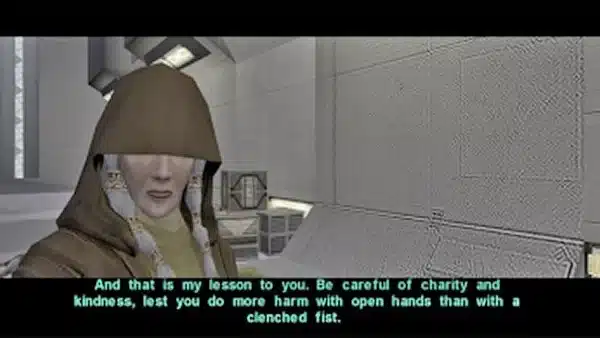
Chapter 4: Kreia’s Legacy in The Old Republic and Beyond
When Star Wars: The Old Republic (SWTOR) rolled onto the scene, fans of the Knights of the Old Republic series were eager to see how the characters and stories they loved would continue to resonate in this new era. And while Kreia herself doesn’t make a direct appearance in SWTOR—probably too busy brooding in some metaphysical corner of the galaxy—her presence is felt nonetheless.
You see, Kreia was never the kind of character to just fade away. Even after her death, her ideas, philosophies, and downright contrarian viewpoints managed to seep into the wider Star Wars universe like a really stubborn stain. In SWTOR, we encounter characters and factions that seem to have taken a page (or an entire chapter) out of Kreia’s book. Whether it’s the Sith Empire, with its endless power struggles and manipulations, or the Jedi Order, still grappling with its rigid dogma, Kreia’s shadow looms large.
There are moments in SWTOR where you can almost hear Kreia’s voice whispering in the background, nudging characters to question their choices, to ponder the nature of the Force, and to consider whether their actions are truly their own or if they’re just dancing to the tune of some cosmic puppet master. Her legacy is less about direct influence and more about the subtle shifts in thinking that she inspired. It’s like she left little philosophical time bombs throughout the galaxy, and they’re still going off centuries later.
The Sith and Jedi: Struggling with Kreia’s Philosophies
One of the most intriguing aspects of Kreia’s legacy in SWTOR is how both the Sith and Jedi Orders wrestle with the questions she raised. Kreia’s disdain for the Force as a manipulative entity wasn’t exactly the kind of thing the Jedi Council would put on a motivational poster, but her criticisms have found their way into the cracks of both the light and dark sides.
The Sith, who are often portrayed as the galaxy’s ultimate bad guys, have a curious relationship with Kreia’s ideas. On the one hand, they embrace the notion of breaking free from the chains of destiny and seizing power through sheer force of will—concepts that Kreia herself dabbled in during her time as Darth Traya. But on the other hand, Kreia would have probably looked at the Sith and rolled her eyes at their short-sightedness. To her, they were just as enslaved to the Force as the Jedi, only they were too busy cackling maniacally to notice.
The Jedi, meanwhile, continue to struggle with their own dogma, and Kreia’s critiques echo in the minds of those who dare to question the Order’s teachings. In SWTOR, we see Jedi characters grappling with the rigidity of their beliefs and the consequences of following the Force without question. It’s as if Kreia’s voice is still out there, challenging them to think beyond the binary of light and dark, to consider that maybe—just maybe—the Force isn’t the ultimate good they believe it to be.
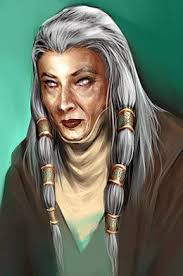
Kreia in Star Wars Comics: A Philosophical Footprint
Kreia’s influence isn’t confined to video games; she’s also left her mark on the wider Star Wars lore, including comics and novels. While she may not appear in the flesh (or whatever the comic book equivalent is), her ideas and philosophies have certainly made the jump to this medium.
In some of the Star Wars comics, particularly those set in the Old Republic era, we see characters wrestling with the same questions Kreia posed. The nature of the Force, the morality of the Jedi and Sith, and the idea of breaking free from predestination—these are themes that pop up time and again. It’s like Kreia planted the seeds of doubt and intellectual rebellion, and now they’re sprouting all over the place, much to the dismay of those who prefer their Star Wars stories a bit more straightforward.
In these comics, Kreia’s legacy can be seen in the actions and thoughts of various characters, some of whom echo her skepticism and philosophical depth. Whether it’s a Jedi questioning the dogma they’ve been taught or a Sith pondering the futility of their endless quest for power, Kreia’s influence is there, lurking in the background like a particularly persistent plot twist.
Kreia in Novels: The Intellectual Legacy Continues
Kreia’s ideas also find fertile ground in the Star Wars novels, where authors have the space to explore the more nuanced and philosophical aspects of the galaxy. While Kreia herself may not headline these stories, her legacy is woven into the fabric of the Old Republic era and beyond.
In these novels, characters often grapple with the same moral and ethical dilemmas that Kreia introduced in KOTOR II. The nature of the Force, the role of free will, and the consequences of blind obedience to either the light or dark side are themes that continue to resonate. Kreia’s teachings, though perhaps not directly referenced, are reflected in the struggles of characters who find themselves caught between the rigid ideologies of the Jedi and Sith.
The novels also explore the long-term impact of the Jedi Civil War and the events of KOTOR II, where Kreia’s influence was most keenly felt. Even centuries after her death, the galaxy is still dealing with the repercussions of the philosophical battles she waged. It’s a testament to the depth of her character that even when she’s not present, Kreia’s ideas continue to provoke thought and challenge the status quo.
The Lasting Impact: Kreia’s Role as a Philosophical Provocateur
When we talk about Kreia’s legacy, it’s not just about what she did or the events she influenced—it’s about the questions she left behind. Kreia is, above all else, a provocateur. She’s the character who forces you to confront uncomfortable truths, to question your assumptions, and to think critically about the very foundations of the Star Wars universe.
In a galaxy where so much is often presented in stark contrasts—light vs. dark, good vs. evil—Kreia is the voice whispering that maybe things aren’t so simple. Maybe the Force isn’t the benevolent guiding force it’s made out to be. Maybe the Jedi and Sith are just two sides of the same coin, trapped in an endless cycle of conflict that serves no one but the Force itself.
Kreia’s legacy is one of intellectual curiosity and moral complexity. She challenges players, readers, and characters alike to think beyond the binary, to see the galaxy not in black and white but in shades of gray. And in a universe as vast and varied as Star Wars, that’s a perspective that continues to resonate long after Kreia herself has left the stage.
So, even though Kreia might not be making guest appearances in the latest Star Wars films or leading the charge in a new video game, her influence is still felt. She’s the ghost in the machine, the nagging doubt in the back of your mind, and the reminder that sometimes, the most important battles aren’t fought with lightsabers, but with ideas.
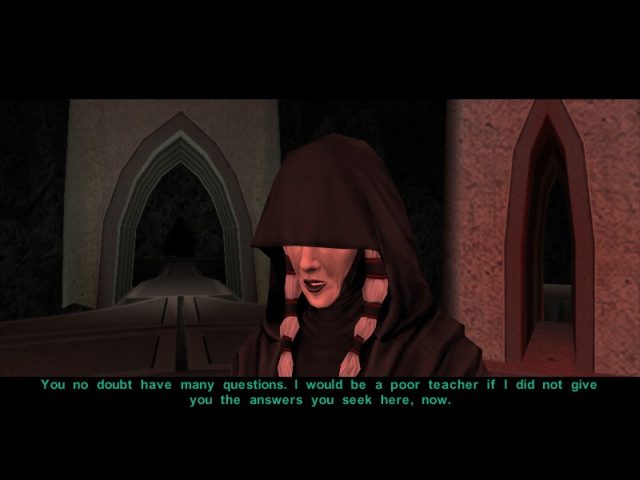
Chapter 5: Kreia’s Enduring Impact on the Star Wars Universe
When we talk about characters in the Star Wars universe who have left a lasting impact, Kreia might not be the first name that comes to mind—unless, of course, you’re the kind of fan who enjoys deep philosophical debates about the nature of the Force. In that case, Kreia is practically your Jedi Master (or Sith, depending on how you view her). But even for those who don’t spend their free time pondering the cosmic balance of the galaxy, Kreia’s impact on Star Wars lore is undeniable.
Kreia’s ideas, particularly her belief that the Force is a manipulative entity, have added layers of complexity to a universe that is often depicted in terms of good vs. evil. Before Kreia came along, the Force was generally viewed as a mystical energy field that was either good or bad depending on who was wielding it. But Kreia introduced the idea that maybe the Force itself isn’t as benevolent as it’s cracked up to be. Maybe, just maybe, the Force is pulling everyone’s strings—Jedi, Sith, and everyone in between—keeping the galaxy in a perpetual state of conflict for its own mysterious purposes.
This idea of the Force as a manipulative force (pun intended) has influenced how fans and creators alike think about the Star Wars universe. It’s one of those ideas that sticks with you, like a catchy tune you can’t get out of your head. And while Kreia might not be mentioned explicitly in every discussion about the Force, her influence is there, lurking in the background, challenging the simplistic notions of light and dark, good and evil.
Kreia’s Legacy in Gaming: Beyond KOTOR II
Let’s face it: Kreia is one of the most memorable characters in Star Wars video games, and not just because she’s voiced by the legendary Sara Kestelman (though that definitely helps). KOTOR II isn’t just a game; it’s an experience, and Kreia is a huge part of why it’s so memorable. Her character isn’t just a guide or a mentor—she’s a force (again, pun intended) that drives the narrative forward, making you question your choices and rethink what you know about the Star Wars universe.
But Kreia’s impact didn’t end when the credits rolled. Her character has influenced other Star Wars games in ways that might not be immediately obvious. For example, the emphasis on moral choices in later games like Mass Effect (which, yes, isn’t a Star Wars game, but bear with me) can be traced back to the kind of moral dilemmas that Kreia throws at the player in KOTOR II. Even in more recent Star Wars games, where the moral lines might not be as blurred as they are in KOTOR II, the idea that your choices have deeper consequences is something that Kreia helped popularize.
And then there’s the matter of Kreia herself. Even in games where she doesn’t appear, her influence can be felt. Characters who embody her philosophical depth, who challenge the player to think rather than just react, owe a debt to Kreia. She set the bar for what a mentor character in a Star Wars game could be—not just a source of wisdom, but a catalyst for change, both in the game’s narrative and in how players think about the Star Wars universe.
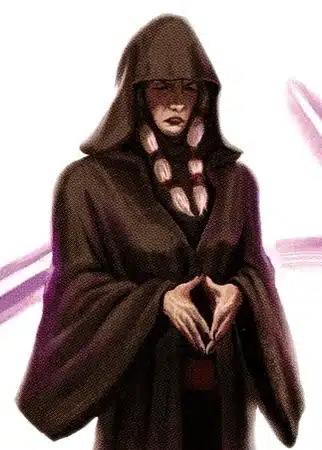
Kreia’s Philosophical Legacy: A Challenge to Simplistic Narratives
In many ways, Kreia’s most significant impact on the Star Wars universe is philosophical. Star Wars has always been a story about good vs. evil, light vs. dark, but Kreia throws a wrench into those binary oppositions. She’s not interested in simple answers or easy solutions. Instead, she forces us to grapple with the complexities of the Force, the nature of power, and the consequences of our actions.
Kreia’s skepticism towards the Force isn’t just a quirky character trait—it’s a direct challenge to one of the foundational elements of the Star Wars narrative. The Force has always been portrayed as a guiding force (last pun, I promise), something that brings balance to the galaxy. But Kreia asks, “Balance for whom?” She suggests that the Force might be less interested in balance and more interested in maintaining a status quo that keeps the galaxy in a cycle of conflict and strife.
This idea isn’t just a clever twist—it’s a fundamental challenge to how we understand the Star Wars universe. It forces us to reconsider the roles of the Jedi and the Sith, to question whether they’re really the heroes and villains they appear to be, or whether they’re just pawns in a larger, more insidious game. Kreia’s philosophy invites us to look beyond the surface, to dig deeper into the motivations of the characters and the forces that drive them.
Kreia’s Influence on Future Star Wars Media: The Legacy Continues
While Kreia herself hasn’t appeared in the more recent Star Wars films or TV shows, her influence is still there, subtly shaping how these stories are told. Take, for example, the character of Luke Skywalker in The Last Jedi. Now, Luke isn’t Kreia by any means, but there’s a certain similarity in how he questions the Jedi Order and its legacy. Like Kreia, Luke comes to see the flaws in the Jedi teachings, and he’s not afraid to challenge the idea that the Jedi are the ultimate force for good in the galaxy.
Even in The Mandalorian, we see echoes of Kreia’s influence in characters like Ahsoka Tano, who walks the line between Jedi and non-Jedi, rejecting the rigid structures of the Order in favor of a more nuanced understanding of the Force. These characters, whether directly influenced by Kreia or not, embody the same kind of skepticism and intellectual curiosity that made her such a compelling figure.
And let’s not forget the Star Wars comics and novels that continue to explore the philosophical implications of the Force. In these stories, we see characters grappling with the same kinds of questions that Kreia raised in KOTOR II—questions about destiny, free will, and the true nature of the Force. Kreia’s legacy lives on in these narratives, challenging readers to think more deeply about the Star Wars universe and their place in it.
Kreia’s Enduring Impact: A Character Who Transcends Time
At the end of the day, Kreia’s impact on the Star Wars universe isn’t just about what she did or the choices she made—it’s about the questions she left behind. Kreia is a character who transcends the story she was part of, leaving a legacy that continues to shape how we think about Star Wars, its characters, and its lore.
Kreia’s enduring impact is a testament to the power of a well-written character, one who isn’t content to be just another mentor or villain, but who challenges the very foundations of the world she inhabits. She’s a character who forces us to think, to question, and to reconsider what we know about the galaxy far, far away.
So, while Kreia might not be a household name like Darth Vader or Luke Skywalker, her influence is just as profound. She’s the philosophical ghost in the Star Wars machine, haunting the narrative and reminding us that nothing is ever as simple as it seems. Kreia’s legacy is one of complexity, depth, and intellectual rigor—a legacy that will continue to resonate in the Star Wars universe for years to come.
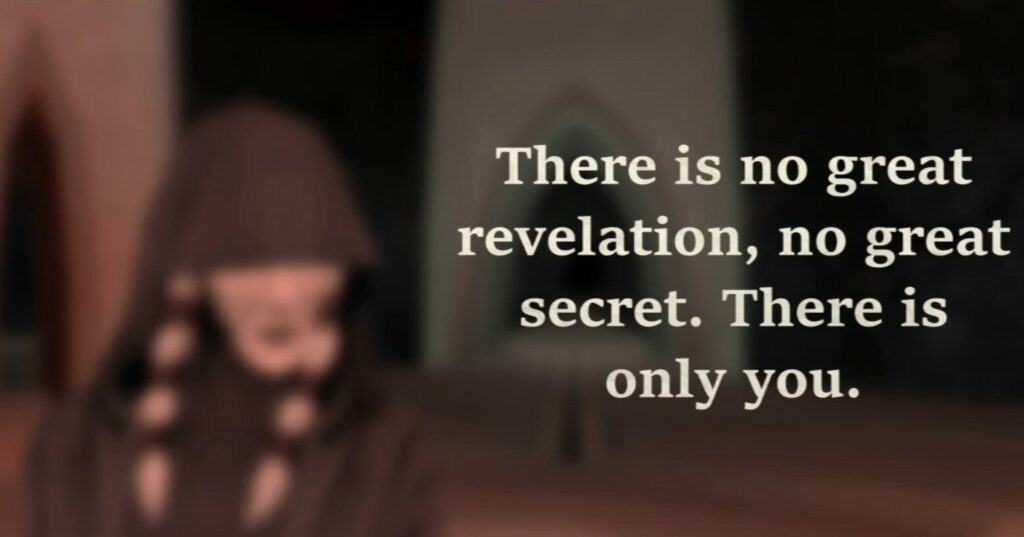
Conclusion: Kreia’s Complex Legacy in the Star Wars Universe
Kreia is a character who defies easy categorization, embodying the intellectual and moral complexities that make the Star Wars universe so rich and enduring. From her mysterious origins and her deep connection to Revan, to her pivotal role in Knights of the Old Republic II: The Sith Lords, and her subtle but profound influence in The Old Republic and beyond, Kreia’s legacy is one of depth, nuance, and relentless questioning.
In her early life, Kreia’s unorthodox views and philosophical inquiries set the stage for her later transformation into Darth Traya, a Sith Lord who challenged not just the Jedi and Sith, but the very nature of the Force itself. Her relationship with Revan during the Jedi Civil War further demonstrated her complex view of the galaxy, one that rejected simple binaries and embraced the gray areas where true understanding lies.
As the enigmatic mentor in KOTOR II, Kreia pushed players to confront the moral and philosophical dilemmas that define the Star Wars universe. Her teachings were not just about choosing between light and dark, but about understanding the consequences of those choices and the deeper nature of the Force. Her manipulation and ultimate goal to destroy the Force itself revealed a character driven by a desire to break free from what she saw as the galaxy’s greatest shackle.
Kreia’s legacy extends beyond her role in one game; it permeates the broader Star Wars lore. In SWTOR, comics, and novels, her ideas continue to influence characters and stories, challenging them to think critically about the Force and their place in the galaxy. Kreia’s philosophical provocations have left an indelible mark, encouraging both fans and creators to explore the complexities of the Star Wars universe in ways that go beyond traditional narratives.
In the end, Kreia’s enduring impact on the Star Wars universe is a testament to the power of a character who isn’t afraid to ask the tough questions. She’s not just a mentor, not just an antagonist, but a figure who challenges us to think more deeply about the stories we love. Kreia’s legacy is one of intellectual depth and moral ambiguity, reminding us that in a galaxy filled with heroes and villains, the most interesting stories are often found in the spaces between.


